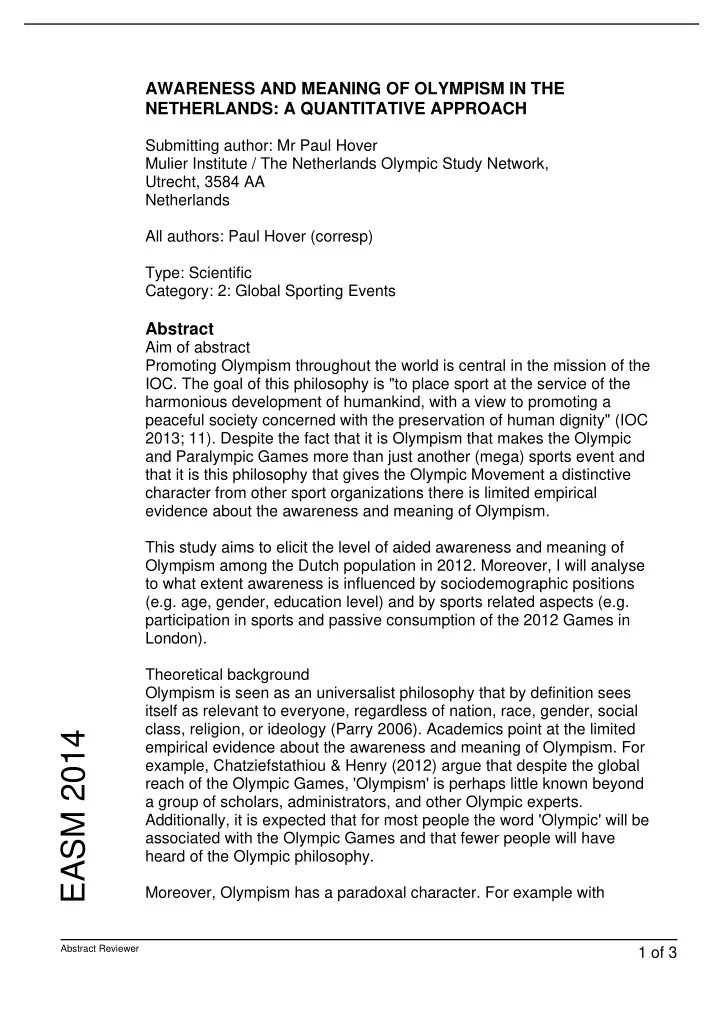

AWARENESS AND MEANING OF OLYMPISM IN THE NETHERLANDS: A QUANTITATIVE APPROACH Submitting author: Mr Paul Hover Mulier Institute / The Netherlands Olympic Study Network, Utrecht, 3584 AA Netherlands All authors: Paul Hover (corresp) Type: Scientific Category: 2: Global Sporting Events Abstract Aim of abstract� Promoting Olympism throughout the world is central in the mission of the IOC. The goal of this philosophy is "to place sport at the service of the harmonious development of humankind, with a view to promoting a peaceful society concerned with the preservation of human dignity" (IOC 2013; 11). Despite the fact that it is Olympism that makes the Olympic and Paralympic Games more than just another (mega) sports event and that it is this philosophy that gives the Olympic Movement a distinctive character from other sport organizations there is limited empirical evidence about the awareness and meaning of Olympism.� � This study aims to elicit the level of aided awareness and meaning of Olympism among the Dutch population in 2012. Moreover, I will analyse to what extent awareness is influenced by sociodemographic positions (e.g. age, gender, education level) and by sports related aspects (e.g. participation in sports and passive consumption of the 2012 Games in London).� � Theoretical background � Olympism is seen as an universalist philosophy that by definition sees itself as relevant to everyone, regardless of nation, race, gender, social class, religion, or ideology (Parry 2006). Academics point at the limited EASM 2014 empirical evidence about the awareness and meaning of Olympism. For example, Chatziefstathiou & Henry (2012) argue that despite the global reach of the Olympic Games, 'Olympism' is perhaps little known beyond a group of scholars, administrators, and other Olympic experts. Additionally, it is expected that for most people the word 'Olympic' will be associated with the Olympic Games and that fewer people will have heard of the Olympic philosophy. � � Moreover, Olympism has a paradoxal character. For example with Abstract Reviewer 1 of 3
respect to the actions required to protect a commercial property (like the Olympic symbols) and those required to nurture a global social movement for change (Girginov & Parry 2005). Or the paradoxes between friendship and rivalry and between grassroots and elite sports.� � The Netherlands has an Olympic history as the 1928 Games took place in Amsterdam. Furthermore, during several years the national government supported the Olympic Plan 2028. The goal of the Olympic Plan 2028 - which was inspired by the philosophy of Olympism - was to host the 2028 Games in The Netherlands and has been regarded as a Masterplan of The Netherlands as it reached beyond sports.� � Methodology, research design and data analysis� Data were collected in the autumn of 2012 by means of an online questionnaire among a random sample of the Dutch population (15-80 years). 1,016 questionnaires were completed. Respondents who were familiar with Olympism (n=570) were asked - by means of an open ended question - which key words they associated with Olympism. Both bivariate and multivariate analyses (logistic regression) were conducted.� � Results, discussion and conclusions� The results show that more than half of the adult Dutch population - 53 per cent - is familiar with Olympism. Men, participants in sports, people with a higher educational level and older people are overrepresented. This is also the case for people who followed the 2012 Games in the media. The key words ‘participate’, ‘together’ and ‘sportsmanship’ are top of mind among the part of the Dutch population which is familiar with Olympism. Critical aspects like ‘doping’, ‘nuisance’ and ‘costs’ were mentioned by smaller groups of people. During my presentation results of multivariate analyses will be presented. � � Findings not only give empirical evidence to the extent in which the Dutch population is acquainted with and gives meaning to ‘Olympism’, but the results can also be of help to the IOC in their objective to promote Olympism as well as for Olympic education strategies of National Olympic Committees, National Olympic Academies and host cities. References EASM 2014 References� Chatziefstathiou, D. & I.P. Henry, (2012). Discourses of Olympism. From the Sorbonne 1894 to London 2012. Basingstoke: Palgrave Macmillan.� � Girginov, V. & J. Parry (2005). The Olympic Games explained. A student guide to the evolution of the modern Olympic Games. Abingdon: Routledge.� � IOC (2013). Olympic charter. In force as from 9 september 2013. Abstract Reviewer 2 of 3
Lausanne: IOC.� � Parry, J. (2006). Sport and Olympism: Universals and Multiculturalism, Journal of the Philosophy of Sport, 33:2, 188-204. London/New York: Routledge/Taylor & Francis Group. EASM 2014 Abstract Reviewer 3 of 3
Recommend
More recommend